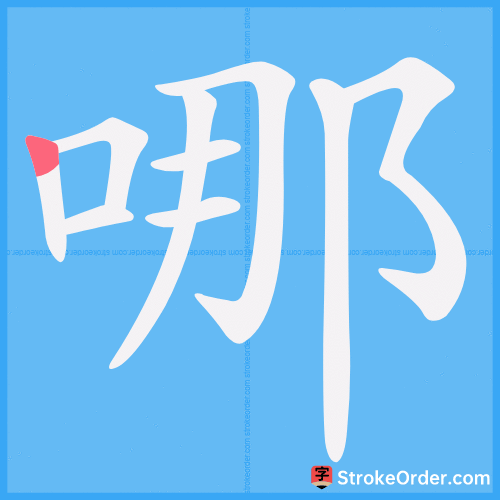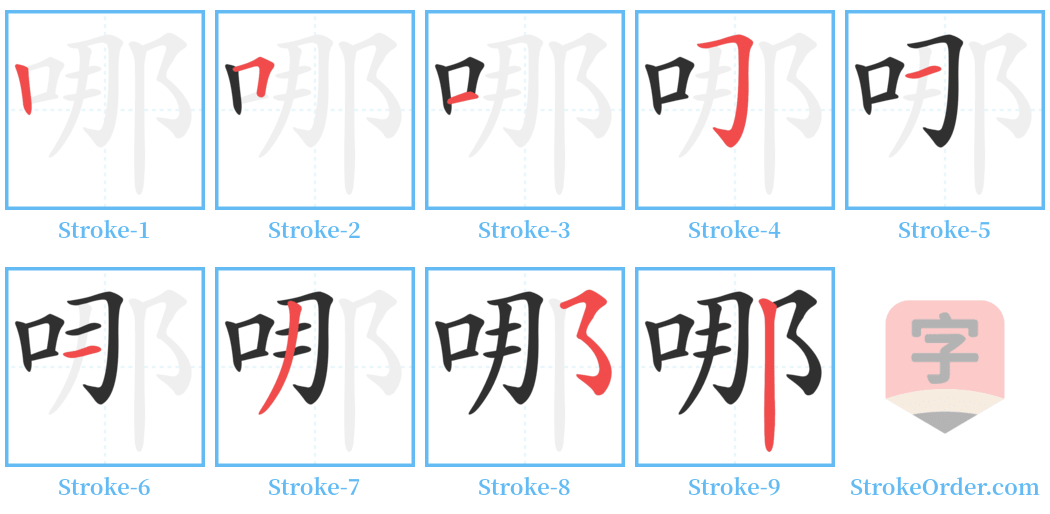哪 Stroke Order
Animated Stroke Order of 哪

Stroke Order Diagrams for 哪

Step-by-Step Handwriting Guide for 哪

Learn to Write Chinese Characters with Video Tutorials
Watch the video of writing the Chinese character "哪", learn the correct stroke order (笔顺) of the character "哪", and master the standard way of writing the character "哪".
Free Printable Handwriting Practice with Stroke Order: 哪
Printable Writing Practice Worksheet of "哪" in Portrait Orientation (Tian Zi Ge)

Printable Writing Practice Worksheet of "哪" in Landscape Orientation (Tian Zi Ge)

Information of 哪
Pinyin
nǎ、 na、 né
Radical
口
Strokes
9 strokes
Usage
★★★★★
Definition
how / which, (final part. preceded by N), which (followed by M or Num)
哪 [nǎ]
1. Interrogative word, followed by a noun or a numeral, indicating a request for clarification within the scope of inquiry.
- Example: 哪样 (which kind); 哪里 (where, a. what place; b. used in rhetorical questions to indicate negation, e.g., "我~~知道?" (How would I know?) "他~~笨啊?" (How could he be so foolish?); c. a humble expression to decline praise).
2. Questioning word, primarily for differentiating among the same type of items ([En.] which).
- Example: 哪间房是你的? (Which room is yours?); 哪一年的事? (Which year was it?)
3. Indicates any one ([En.] any).
- Example: 生、旦、净、末,哪一门也有很多专家 (In the fields of Sheng, Dan, Jing, Mo, there are many experts in any one); 无论哪一处名湖胜景,都比不过这处 (No matter which famous lake scene, none compares to this one).
4. Used for vague reference, indicating an uncertain one ([En.] someone).
- Example: 指哪打哪 (Wherever you point, that's where you hit).
5. Adverb used for rhetorical questions to express affirmation, negation, or intensification ([En.] why; how).
- Example: 又不是你的东西,哪能随便拿 (It's not your thing, how can you just take it?)
6. A combination sound of "哪" and "一," but the quantity is not limited to one.
- Example: 哪个 (which one); 哪年 (which year); 哪会儿 (which moment); 哪些 (which ones).
7. "哪一" as a continuous combination sound, but referring to a quantity not limited to one ([En.] which).
- Example: 哪棵树? (Which tree?); 哪帮人? (Which group of people?)
8. A particle indicating the changes in the preceding word's final sound due to the influence of the vocal sound "n."
- Example: 加油干~! (Let’s go for it!)
9. An expression variation of "啊" ([En.] modification of sound of 啊). Used to express astonishment, warning, or pause. Also represented as "那," "嗱."
- Example: 心里该有多甜哪! (How sweet it must be in your heart!); 你要留神哪! (You should be careful!); 看哪,禾苗长得多壮 (Look, how strong the seedlings are growing!).
10. Name of a deity in Chinese mythology (with light tone on "吒").
Also see: nǎ; na; nǎi; né; něi.
where? / somewhere / anywhere / wherever / nowhere (negative answer to question) / humble expression denying compliment / also written 哪裡|哪里
Input Method for 哪
Pinyin
na3
Wubi
kvfb|kngb
Cangjie
rsql
Zhengma
jyby
Four Corner
67027
Unicode
U+54ea
Same Pronunciation Characters